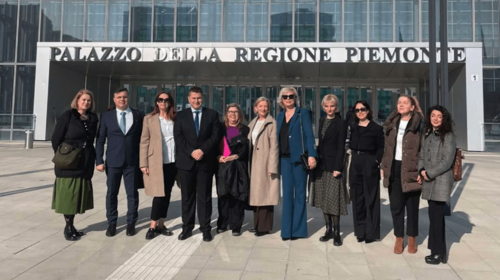Updates
Bosnia and Herzegovina: Study visit on cancer prevention – learning from the Turin experience
07 Apr 2025TURIN, Italy – Cancer is a significant public health issue and leading cause of death in Bosnia and Herzegovina. The need for high-quality cancer prevention programmes is urgent.
Breast cancer is particularly deadly. The most fatal cancer among women, it claims approximately 11 lives each week. Cervical cancer, which is largely preventable and treatable when detected early, results in about three deaths a week. Each year, colorectal cancer takes over 1,000 lives, affecting men and women equally, and prostate cancer results in around 450 male deaths.
These statistics from the World Health Organization (WHO) underline the importance of a joint European Union and United Nations programme. With European Union funding, UNFPA and WHO implement the initiative, entitled “Comprehensive Research on Cervical, Breast, Colorectal, and Prostate Cancers in Bosnia and Herzegovina”.
Learning about what works
The programme recently sponsored healthcare professionals from Bosnia and Herzegovina for a study visit to the Piedmont Center for Oncological Prevention in Turin. The centre is one of Italy’s leading cancer prevention institutes, known for high rates of screening and early detection. Meetings with experts, facility tours and hands-on learning shared the latest research on all four cancers and provided valuable insights to enhance early detection back in Bosnia and Herzegovina.
During a stop at the Breast Cancer Prevention Center, Dr. Vincenzo Marra and Dr. Franca Artuso demonstrated how well-structured screening programmes can significantly improve survival rates. Dr. Roberta Castagno walked the delegation through cervical cancer screening protocols, giving constructive feedback on how to align with European Union standards, and emphasizing service accessibility and increased public awareness.
"This exchange was incredibly useful," Dr. Sinisa Skocibusic, Director of the Public Health Institute of the Federation of Bosnia and Herzegovina, told UNFPA. "We gained insight into successful screening programmes and tools that can be applied in our country. The practical visits and discussions with experts were particularly valuable."
Dr. Andja Nikolic from the Department of Health of the Government of Brcko District echoed similar conclusions, commenting, “Early detection provides a much greater chance for recovery, and structured screenings like the ones in Turin offer a model we could implement."
Reaching more people saves lives
Other specialists at the Piedmont Centre shared specific strategies to enhance public participation in screening programmes. Dr. Cristiano Piccinelli highlighted how effective data management systems can improve outreach to target populations.
As Dr. Enida Imamovic from UNFPA in Bosnia and Herzegovina emphasized, “Clear and effective communication about preventive services and their significance is essential.”
One key takeaway was the importance of structured, government-supported cancer prevention programmes. At the Piedmont Regional Government headquarters, discussions with local policymakers reinforced the vital role of international cooperation in public health.
With new knowledge of best practices in cancer prevention, health professionals in Bosnia and Herzegovina are now better positioned to save lives.
